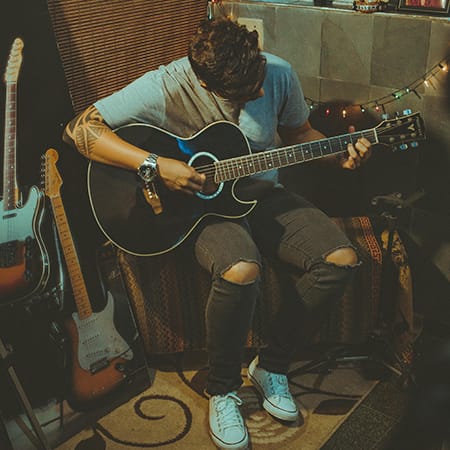
Starting your music journey is exciting, filled with potential and creativity. However, it’s also a time of learning, experimentation, and sometimes unexpected challenges.
Here are 10 essential steps to help you kickstart your journey with purpose, direction, and a few insider tips to keep you on track!
1. Build Your Catalog 🎼
The best way to find your unique sound is by creating—a lot! Don’t wait for every song to be perfect. Instead, aim for volume. Writing and recording often will help you refine your style and discover what resonates with you and your future audience.
Think of each song as a building block. With time, you’ll develop a cohesive sound, and your catalog will be a testament to your growth.
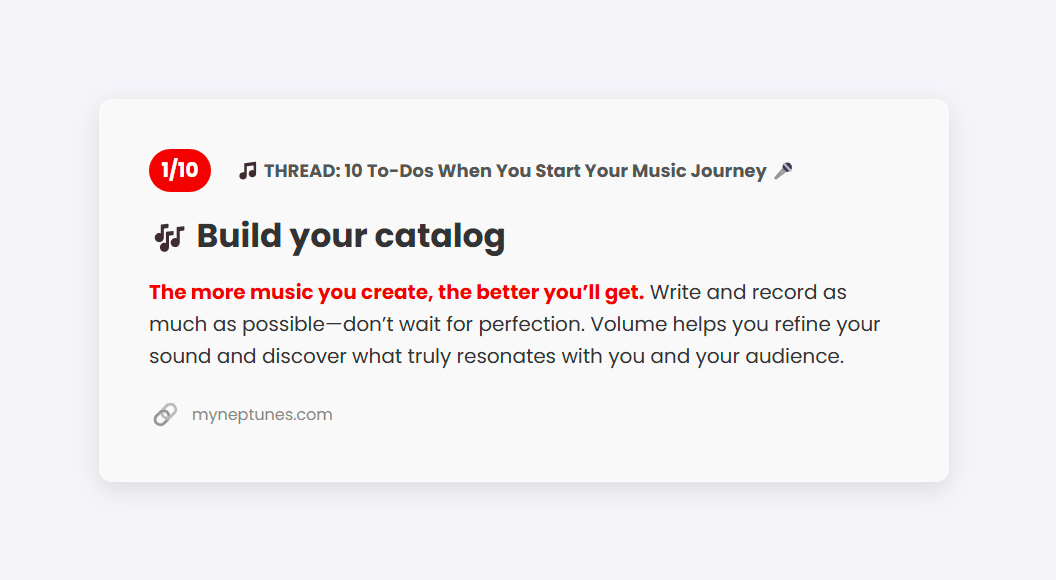
Pro Tip: Set a regular schedule for creating, whether it’s daily writing sessions or weekly recordings. Repetition is key to finding your voice.
2. Learn Basic Production 🎚️
While you don’t need to be a professional producer, having a grasp of basic production will help you immensely. Knowing how to use software like Ableton Live or GarageBand lets you express your ideas more clearly when working with producers and engineers.
A foundational knowledge of production also gives you greater creative control and opens up possibilities for experimenting with your sound.
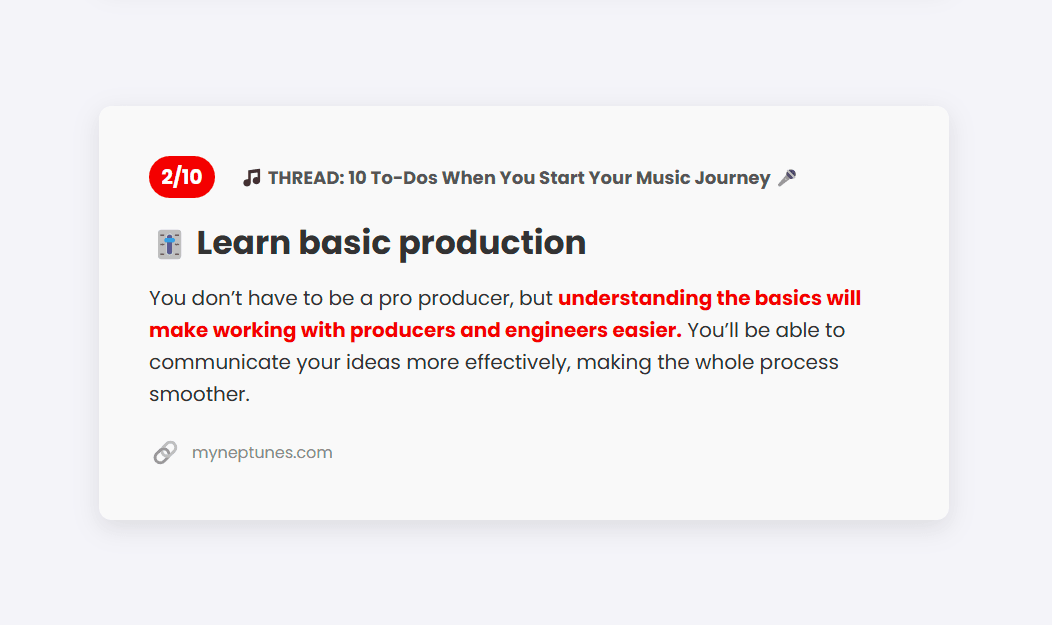
Pro Tip: Start with YouTube tutorials or online courses on production basics to build confidence and technical skills.
3. Invest in Decent Gear 🎙️
When you’re just starting out, you don’t need the highest-end equipment, but a few reliable pieces can make a huge difference in your sound quality and workflow. A solid microphone, audio interface, and comfortable headphones are enough to give you a professional edge while recording from home.
Having quality gear will also save you time and frustration as you start producing and sharing your music.
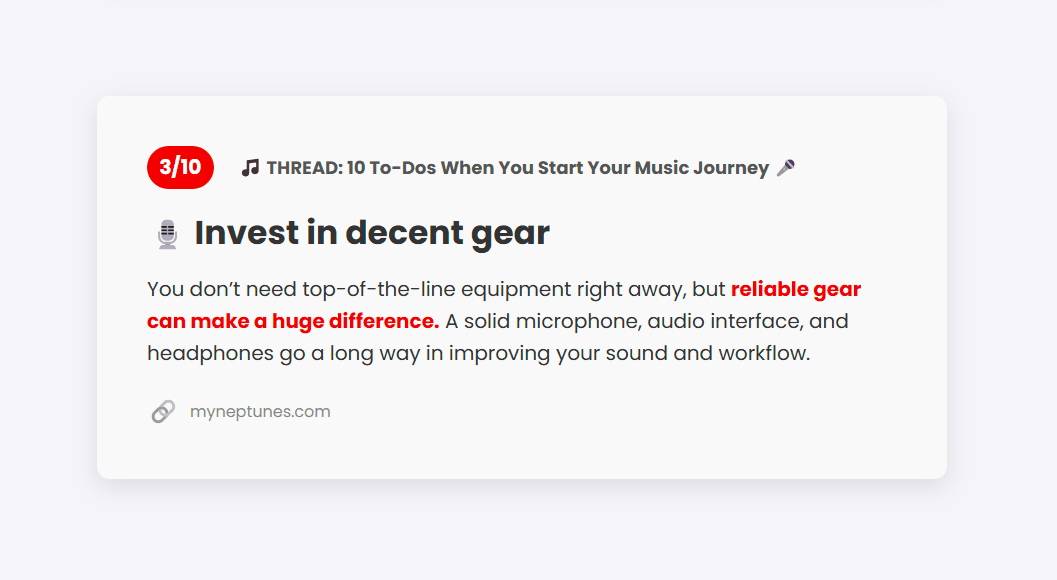
Pro Tip: Look for mid-range gear that is well-reviewed by independent artists. You can always upgrade later, but a good base setup will last you a while.
4. Create a Release Strategy 📅
Releasing music sporadically can make it hard to build momentum and grow your audience. Instead, create a thoughtful release strategy. Think about timing, how you’ll promote each release, and what kind of content you’ll use to keep fans engaged.
A consistent, strategic release schedule can help build buzz around your work and give listeners something to look forward to.
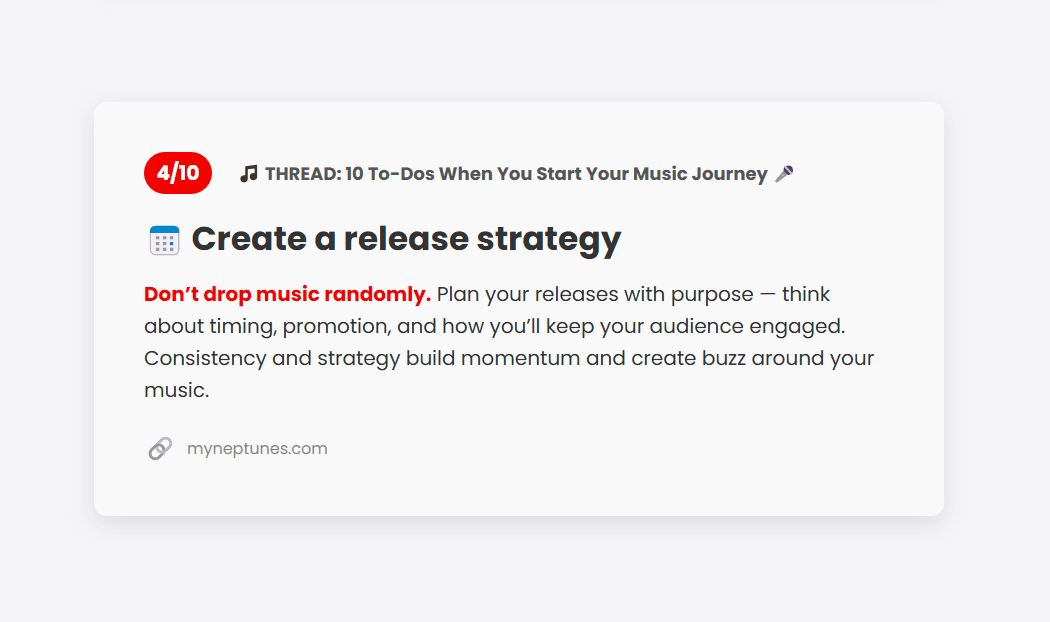
Pro Tip: Consider seasonal timing and genre trends when planning your releases. Anniversaries or holidays related to your genre can be powerful launch moments.
5. Perform Locally 🎸
Local performances are an invaluable way to build your name and gain experience. Start by playing open mics, showcases, and smaller gigs in your area. Performing live will help you hone your stage presence, meet other local musicians, and build a loyal fanbase in your community.
These early supporters can become lifelong fans who will champion your music.
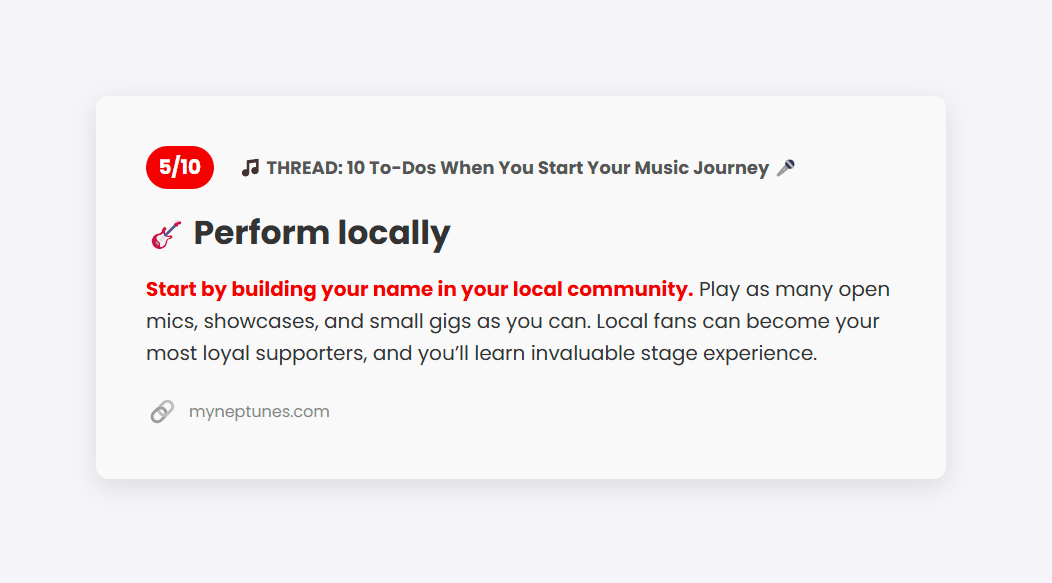
Pro Tip: Connect with local venue managers and keep an eye on community event listings. Consistent gigging locally can open doors to larger opportunities down the road.
6. Engage on Social Media 📲
Social media is an essential tool for modern artists to connect with fans, showcase their work, and build a following. Share your creative process, give behind-the-scenes looks, and let people get to know you as an artist.
Authenticity is key – let your personality and passion shine through, and don’t worry too much about perfecting every post.
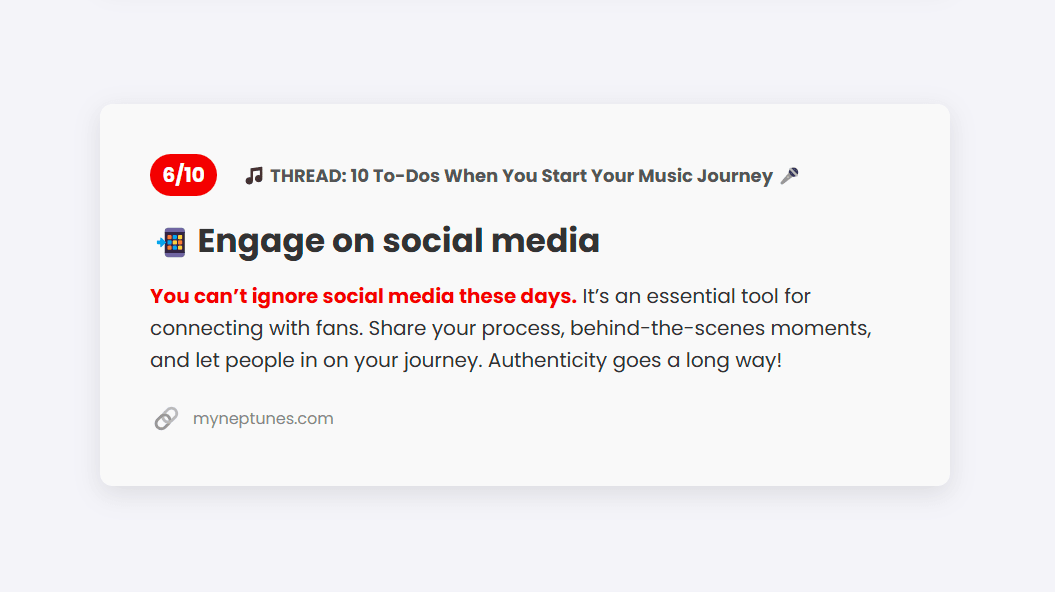
Pro Tip: Use Instagram Stories, TikTok, and Twitter to give quick, raw updates. Fans love the genuine moments that make them feel like part of your journey.
7. Collaborate 🤝
Collaboration is one of the fastest ways to grow as an artist. By working with others, you’ll learn new skills, explore different genres, and gain access to each other’s audiences. Collaborate with producers, songwriters, and even visual artists to broaden your creative network.
Each collaboration brings fresh ideas and the potential for creative synergy that you may not find working alone.
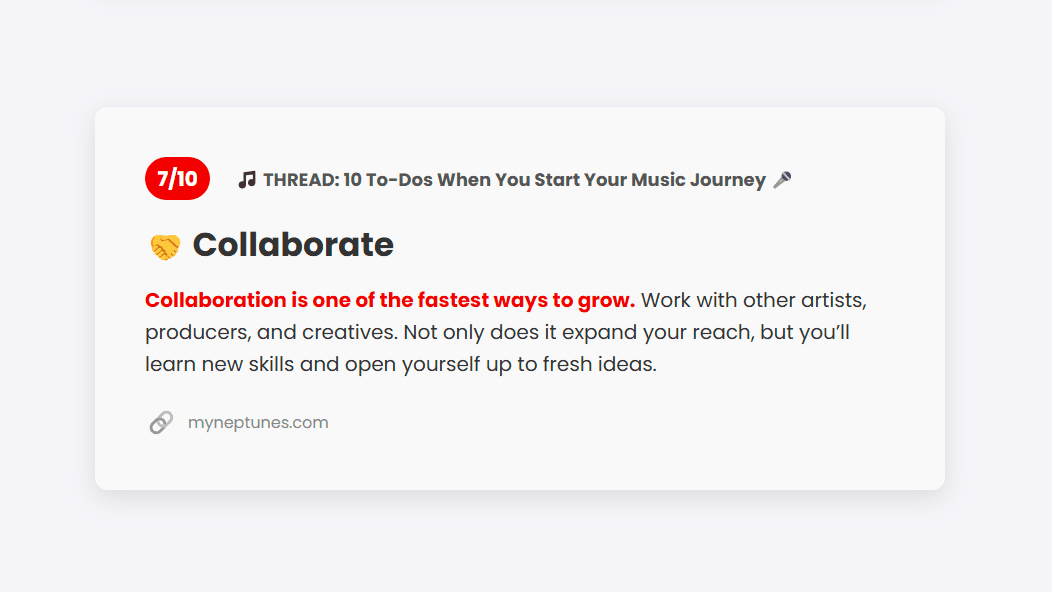
Pro Tip: Look for artists who share similar goals and aesthetic visions. A good collaboration will challenge you while aligning with your vision.
8. Register Your Music 📝
If you’re serious about a career in music, it’s important to make sure your work is protected and that you’re getting compensated for it. Register your music with a PRO (Performing Rights Organization) to collect royalties on performances and streams.
It’s a small but crucial step in safeguarding your music and establishing yourself professionally.
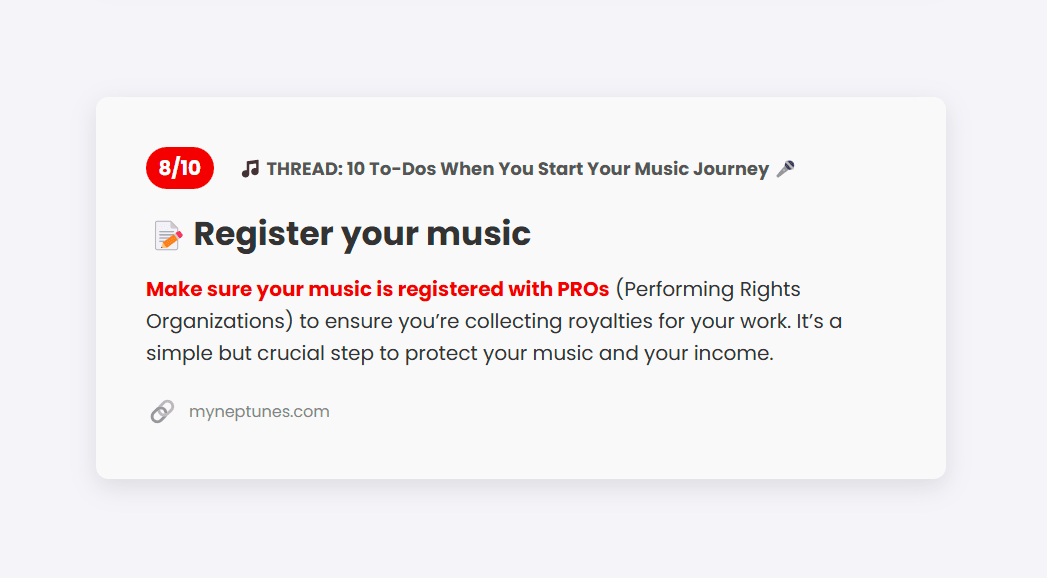
Pro Tip: In the U.S., you can register with PROs like ASCAP or BMI. Do this early to avoid missing out on royalties from the start.
9. Develop Your Stage Presence 🎤
A great live performance can elevate your career, especially in a time when live streaming and concert experiences are highly valued by fans. Focus on becoming comfortable on stage, building a connection with your audience, and learning how to command the space.
Even small gigs provide an opportunity to practice and develop a captivating stage presence.
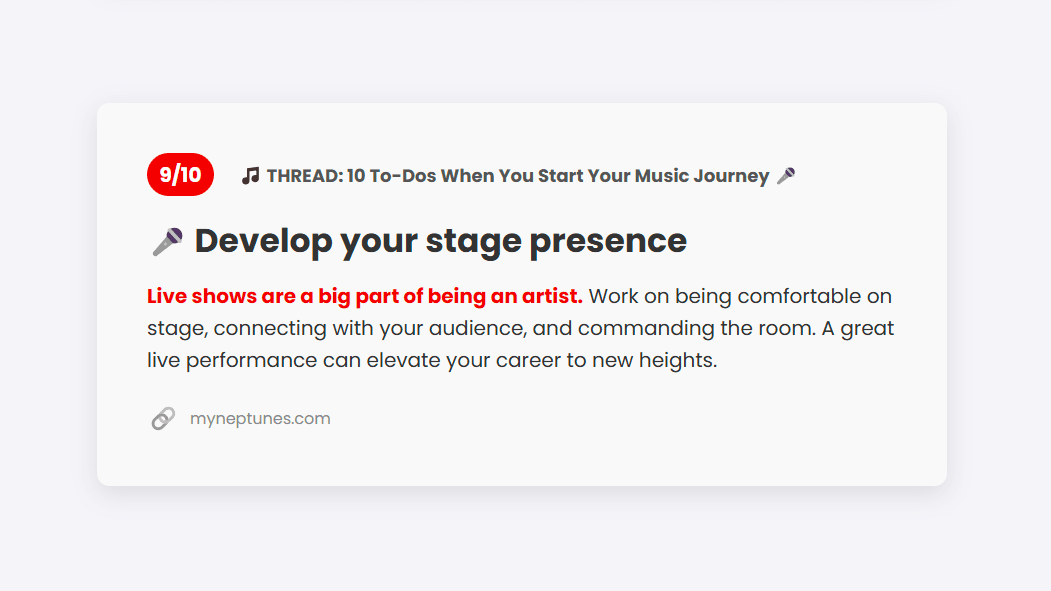
Pro Tip: Record your performances (with permission!) to review later. Watching your performances objectively can help you improve specific aspects, from crowd engagement to energy levels.
10. Study the Greats 🎼
The artists who came before you paved the way, so take the time to study their work and learn from their successes and challenges. Listen to their music, analyze their lyrics, and pay attention to their marketing strategies and stage presence.
Artists like Bob Dylan, Nina Simone, and David Bowie weren’t just talented – they were innovators who understood their audience and adapted to changing times.
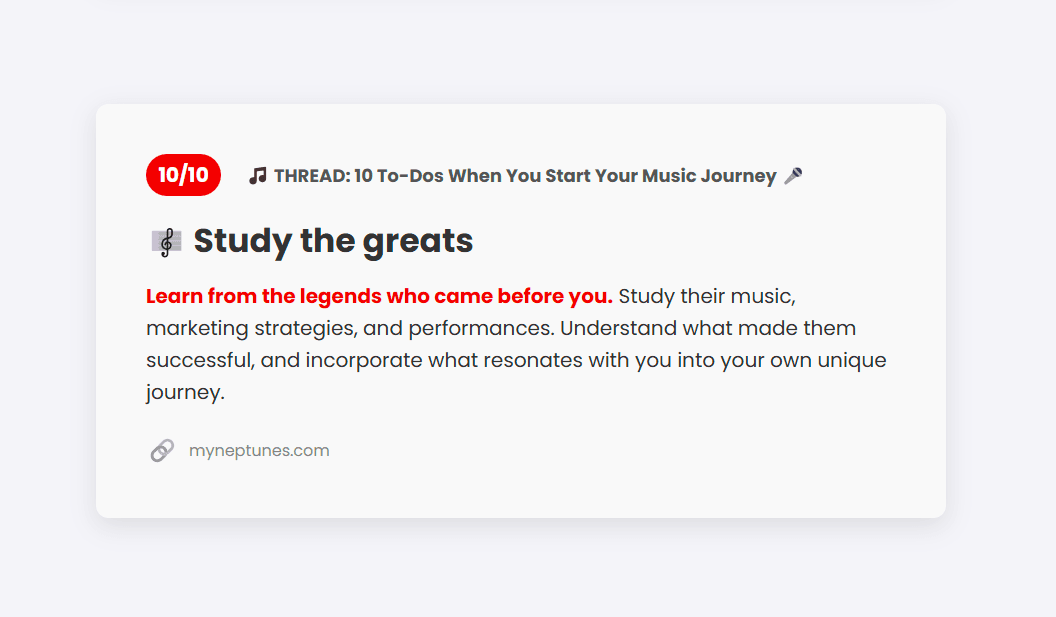
Pro Tip: Make a list of artists you admire and research what set them apart. Incorporate the elements that resonate with you, but don’t forget to keep it personal and original.
Conclusion: Embrace the Journey!
Starting your music career is as much about persistence and passion as it is about raw talent. By following these steps, you’ll build a solid foundation that will serve you throughout your career.
Stay open to learning, keep refining your craft, and never lose sight of the joy and creativity that brought you into music in the first place.
Fuel our passion for supporting emerging artists

Donations are voluntary and do not entitle donors to additional features, services, or benefits. Your support keeps our non-profit alive and thriving. More info

